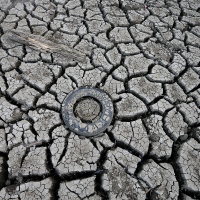Synopsis
The daily drama of money and work from the BBC.
Episodes
-
Record High US Consumer Debt
14/06/2017 Duration: 17minHousehold debt is at record levels as US consumers spend, spend and spend some more. And with America's interest rates set to rise again, could there be trouble ahead?Former Federal Reserve governor Randy Kroszner tells presenter Manuela Saragosa that watching the debt problem get fixed will be like "watching paint dry" - but that it is a deliberately slow process, to avoid shocks to consumers.We hear from retirees in the US who are struggling with debt - and one expert who says that the current workforce may not be able to rely on their pensions when they retire.Also in the programme, Ryan Holmes, the chief executive and founder of social media managing software, Hootsuite, gives his take on whether a company can survive these days without a presence on social media.(Image: Credit cards in a wallet. Credit: Getty Images Staff)
-
Could China Shut Down North Korea?
02/05/2017 Duration: 17minMilitary tensions between the United States and North Korea seem to rise on an almost daily basis. But how important are economic factors in putting pressure on the North Korean state? Could China, with its close trading relationship, choose to shut down North Korea - putting pressure on the leadership there? The BBC's Danny Vincent travels to the border between China and North Korea to look at some of the trade passing between the two nations. And Ed Butler talks to Korea Expert Aidan Foster-Carter and asks him whether China could shut down North Korea if it chose to do so?Also, our veteran commentator Lucy Kellaway admits that she does not always learn from experience.(Picture: A North Korean man standing at a border fence next to the Yalu river, opposite the Chinese border city of Dandong. Credit: JOHANNES EISELE/AFP/Getty Images)
-
Japan's Exploited Foreign Workers
30/04/2017 Duration: 17minJapan's workforce is shrinking due to an ageing population and a policy of very low immigration. But though the world's third largest economy needs workers, the government isn't keen on immigration when it comes to filling lower-skilled jobs. A loophole in the rules, however, means every year about 200,000 labourers from overseas go to Japan on its guest worker trainee scheme. Arranged through a network of brokers in countries such as China and Vietnam, workers often find themselves underpaid, and the US State Department categorises the scheme as human trafficking, and points to mass exploitation. Edwin Lane investigates in Tokyo and Gifu, meeting workers from China who are stuck in Japan fighting for their wages, and to lawyers and politicians about what can be done, and asks why Japan is so hesitant to open its borders to more foreigners.(Image: Tokyo's Akihabara district.Credit: Chris McGrath/ Getty Images)
-
A Basic Income for All?
26/04/2017 Duration: 17minSocial scientists, technologists, and politicians from across the political spectrum think they have a potential solution to the unemployment that automation and artificial intelligence are expected to create. It's called a universal basic income. And it involves getting the state to pay a fixed sum to all of its citizens, whether or not they have a job. The Canadian province of Ontario has become the latest to announce a trial - for 4,000 households. We hear from Finland where a basic income pilot project is already underway. And Manuela Saragosa talks to Guy Standing, co- founder and co-president of the Basic Income Earth Network - who is advising a number of pilot projects around the world.(Picture: Five pound sterling note, London 2017. Credit: DANIEL LEAL-OLIVAS/AFP/Getty Images)
-
Machine Learning
25/04/2017 Duration: 17minMachines are about to get a lot smarter and machine learning will transform our lives. So says a report by the Royal Society in the UK, a fellowship of many of the world's most eminent scientists. Machine learning is a form of artificial intelligence that's already being used to tag people in photos, to interpret voice commands and to help internet retailers to make recommendations.Manuela Saragosa hears about a new technology that is set to revolutionise computing, developed by a UK company called Graphcore. Manuela talks to Graphcore's chief executive Nigel Toon, who is taking on the AI giants.And Manuela hears how we are 'bleeding data' all the time. Dr Joanna Bryson from the University of Bath and professor Amanda Chessell, an IBM distinguished engineer and master inventor, explain how our data is being used.Producer: Laurence Knight(Photo: A robot pours popcorn from a cooking pot into a bowl at the Institute for Artificial Intelligence (AI), University of Bremen, Germany. March 2017. Credit: Ingo Wagner/
-
A Snap Election in Britain
19/04/2017 Duration: 17minThe British Prime Minister Theresa May is proposing a general election for 8 June- and it will be a poll all about Brexit. Mrs May says political divisions are risking Britain's ability to make a success of its departure from the European Union. So will the result of the poll give the prime minister a firm mandate in her negotiations with the EU, and perhaps help her to wangle a better Brexit deal? Manuela Saragosa talks to the BBC's Dominic O'Connell who has been gauging opinion amongst business leaders, including Sir Martin Sorrell, chief executive of advertising giant WPP. And the ethics of digital design. Are we unable to tear ourselves away from computers and TV because we are weak - or because the digital designers are manipulating us unfairly?(Photo: British Prime Minister Theresa May. Credit: Getty Images)
-
Oil's Murky Future
11/04/2017 Duration: 17minTensions in the Middle East and protests in Russia are not just caused by internal politics and war but also, some say, the stresses of economic decline as the result of cheap oil. While the price of oil has gone up this week in response to the US military's missile attack on a Syrian government airbase, this uptick is likely, many analysts say, to be short-lived. Some experts now believe the price of oil could remain low forever. That's the view of Dieter Helm, an economics professor at the University of Oxford, who has just written a book, entitled Burn Out. Ed Butler asks Professor Helm to lay out the possible effects of a permanently lower oil price.Also in the programme, the BBC's Phil Mercer reports from Australia where renewable energy is on the rise. More homeowners are installing solar power battery systems to guarantee that the lights stay on.(Picture: A Russian LUKOIL oil platform. Credit: MIKHAIL MORDASOV/AFP/Getty Images)
-
Libor Lowballing
10/04/2017 Duration: 17minA secret recording that implicates the Bank of England in Libor rigging has been uncovered by the BBC . The 2008 recording adds to evidence the central bank repeatedly pressured commercial banks during the financial crisis to push their Libor rates down. Libor is the rate at which banks lend to each other, setting a benchmark for mortgages and loans for ordinary customers. The Bank of England said Libor was not regulated in the UK at the time. Ed Butler hears more from the BBC's economics correspondent, Andy Verity.Also in the programme, we hear from our Business editor, Simon Jack, about evidence the BBC has seen that top executives at the oil company, Shell, knew money paid to the Nigerian government for a vast oil field would be passed to a convicted money-launderer. The deal was concluded while Shell was operating under a probation order for a separate corruption case in Nigeria. Shell said it did not believe its employees acted illegally. And finally, our regular commentator Lucy Kellaway disapproves of
-
Russian Hacking
04/04/2017 Duration: 17minThe investigation into the hacking of Democratic National Committee computers during the US election campaign continues to haunt international politics. Was Russia responsible for the hack? The US Secret Services say this is now beyond doubt. Just before he left office President Obama hit back with a series of retaliatory measures against Russia. Those measures included a range of sanctions against institutions and people: two intelligence agencies, four senior intelligence officials, 35 diplomats, three tech companies. They also targeted a man who was infamous in tech security circles. His trade name is Slavik. Ed Butler hears the remarkable story behind Slavik's years spent attacking and compromising the servers of international banks and what it all reveals about Russian cyber-espionage.(Picture: An employee walking behind a glass wall with machine coding symbols at the headquarters of Internet security giant Kaspersky in Moscow. Credit: KIRILL KUDRYAVTSEV/AFP/Getty Images)
-
Trump v China, Should We be Scared?
03/04/2017 Duration: 17minAs President Trump prepares for key talks with China's President Xi Jinping, we hear from the editor of the Financial Times, Lionel Barber, who warns that Mr Trump is threatening to go it alone in tackling North Korea, if Beijing refuses to help. Fresh from an interview with Donald Trump in the Oval Office, Mr Barber tells Ed Butler that there is cause to be concerned about the risk of US military action against North Korea. Ed also hears what to expect from the US-China trade discussions this week, with Peter Trubowitz, director of the US Centre at the London School of Economics. And Jennifer Pak reports from Shenzhen in Southern China on the Chinese 'makers', coming up with new ideas (not stolen ones). And Lucy Kellaway says sexism is never acceptable, no matter how old you are.(Picture: North Korean leader Kim Jong-un, impersonated by Hong Kong actor Howard, and US President Donald Trump, impersonated by US actor Dennis, pose outside the US consulate in Hong Kong on in January 2017. Credit:ANTHONY WALLACE/
-
How to Age and Keep Working
05/08/2016 Duration: 16minManuela Saragosa investigates how we should age. We're all living much longer yet we live in a world that prizes youth and productivity above all. So, we're asking how to age? For many of us it will mean working beyond the usual retirement age. Manuela hears from those who argue that's something to welcome, not dread. Including 97-year-old athlete, oarsman, writer and former dentist Charles Eugster. Also in the programme: Lynda Gratton, co-author of The 100-year life and Aubrey de Grey, a British researcher on aging who claims he has drawn a roadmap to defeat biological aging and that the first human beings who will live to 1,000 years old have already been born. (Photo: Charles Eugster at the Henley Royal Regatta. Credit: Getty Images)
-
Unpacking Russia's Economy
02/08/2016 Duration: 17minRussia's economy became mired in sanctions back in 2014. First it was those from the West as a result of Russia's involvement in the Ukraine conflict. Then, exactly two years ago this week, Russia fired back with sanctions of its own. The idea was partly to boost domestic agriculture by replacing foreign imports with Russian ones. It has helped some local cheese-makers. But many consumers are not happy with the loss of foreign goods and general spike in food prices. We also look at the wider economic crash in Russia's economy, with the help of two experts - Alex Nice, an analyst with the Economics Intelligence Unit, and Bill Browder, CEO and a co-founder of the investment fund, Hermitage Capital Management. He was once Russia's most prominent foreign investor before falling out with President Vladimir Putin, and fleeing into exile in 2006. He is doubtful about any predictions of an economic recovery in Russia, as long as the current government remains in power.(Photo: Vladimir Putin depicted on a traditional
-
How to be Frugal
06/05/2016 Duration: 17minWhat happens when you abandon consumerism? The BBC's Ed Butler talks to Pete Adeney, also known as Mr Money Moustache. He retired at 30 and is so frugal he thinks he will never have to work again. Plus, we go urban foraging in London, and a Danish food campaigner tells us what we should do about all that unwanted food left at the back of the freezer.(Photo: A woman sews buttons in Mumbai. Credit: STRDEL/AFP/Getty Images)
-
Australia's Drought
05/02/2016 Duration: 17minOne farmer suffering from the drought in Australia tells BBC Business Daily that it looks "like a lunar landscape", with the ground crackling under his feet. We look at how much the weather conditions have damaged the country's economy. And since the thaw with the US, Cuba is now enjoying a tourist boom - but the country can't keep up with the influx of new visitors - meaning some tourists have ended up sleeping in open squares. (Picture: Cracked land in drought. Credit: Getty Images)
-
Regulating Our Food Choices
03/02/2016 Duration: 17minSugar tax is the hot topic that has got governments, health campaigners and the food industry talking. As rates of obesity and type 2 diabetes rise in many parts of the world, some say taxes on sugary drinks are a simple way of encouraging healthier choices. But should governments make those kinds of judgements? Katy Watson in Mexico and the US, meets those who think a 'sin tax' is the best way forward for fast food and fizzy drinks. She asks Mexico’s government and drinks industry how their sugar tax has affected sales of the products subject to extra tax. And, she hears from food industry lobbysists and those who think that government has no role to play in our food choices.
-
The Economics of Migration
04/09/2015 Duration: 18minIs migration a good thing for economies? Does it bring innovation? Or does it drain resources? We have both sides of the argument as we hear Mark Krikorian, executive director of the Center for Immigration Studies in Washington, debate the matter with Jonathan Portes, director of the National Institute of Economic and Social Research in London. Plus, our reporter Vishala Sri Pathma reports on India's Nestle Maggi instant noodle food scare and how it's affected attitudes towards food in the country. (Picture: Migrant families leaving a transit area in Macedonia; Credit: Dan Kitwood/Getty Images)
-
China's Defence Budget
03/09/2015 Duration: 17minAs China shows off its military muscle in a parade commemorating victory over Japan in World War Two, we examine what lies behind this dazzling display of hardware. China's defence budget has doubled over the last decade, and some of its neighbours are worried. We ask defence analyst, Michael Caffrey of IHS Jane's, whether the numbers are a cause for concern. Also in the programme, as part of the BBC's India season, we hear from Kolkata where millions of Muslims continue to struggle for equal rights in the jobs market. The government is promising tougher action to redress the prejudices against them. And as Azerbaijan this week jails one of its leading investigative journalists and anti-corruption activists, Khadija Ismayilova, we hear her recent assessment of the way economic and political power have been centralised in the hands of the ruling family of President Aliyev. What's really going on in the oil-rich country? Is there an oil curse in Azerbaijan and should this affect international attitudes towards
-
Where are India's Working Women?
02/09/2015 Duration: 17minWomen make up a comparatively small proportion of India's formal labour force. Those that do work tend to be at the extremes of the social spectrum - either poor or highly educated. Why are there not more middle class women working? We hear the stories of a maid and doctor in Delhi, and speak to the newspaper columnist Kalpana Sharma about the cultural and societal factors that are keeping millions of women out of formal employment. Plus the BBC's Katy Watson shows us how women in Latin America and the Middle East also struggle to just get on with their working lives.
-
China: Innovator or Thief?
01/09/2015 Duration: 17minChina's latest factory data is the worst in 3 years. What's wrong with China's business model? Mark Anderson is CEO of InventIP, a consortium of US companies and experts who've put together a report, claiming that some 50% of Chinese growth in recent decades has been founded on the stealing of western business ideas, via old-fashioned industrial espionage and more sophisticated state-sponsored hacking. He exclusively tells the BBC the basis for his claims. And we also hear from Chinese author Edward Tse, who says the old stereotypes of Chinese companies leeching off western technology and possessing few ideas of their own is outdated. He's spent years advising Chinese companies, and in a new book, China's Disrupters, he claims a new genuinely entrepreneurial and innovative spirit has transformed the country's business climate.
-
Elements: Hydrogen and Acids
19/08/2015 Duration: 17minThese powerful chemicals are essential to obtain the minerals that build our world, the fertilisers that feed the planet, and the fuels that propel our vehicles - as presenter Laurence Knight discovers on a trip to the Ineos Grangemouth oil refinery in Scotland. But while most traditional acids are based on the power of hydrogen ions, Prof Andrea Sella of University College London explains that many modern industrial "acids" do not, and come in startlingly unexpected forms such as powders. Many of the most corrosive acids are very tricky to contain, resulting in the occasional nasty accident, as chemical engineer Keith Plumb explains. Also, Justin Rowlatt has a report on acid attacks in southern Asia in which he speaks to campaigner Selina Ahmed of the Acid Survivors Foundation on how Bangladesh has tackled the problem. (Picture: A team working with toxic acids and chemicals secures a chemical cargo train tanks crashed near Sofia, Bulgaria; Credit: Cylonphoto/Thinkstock)
















